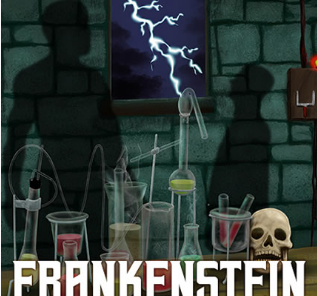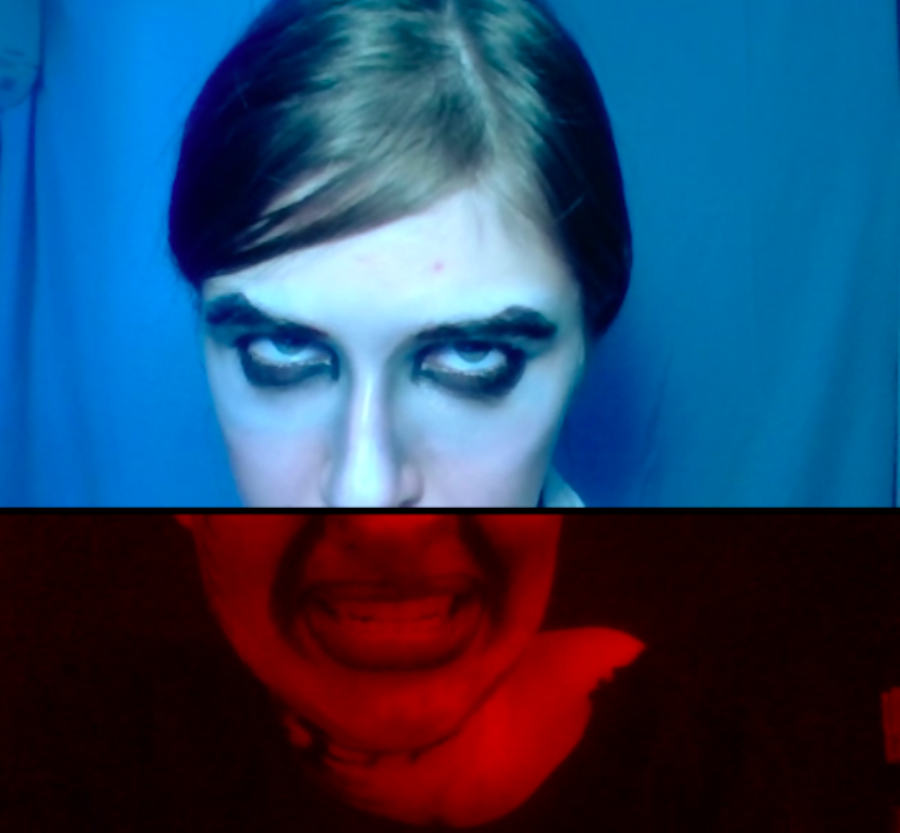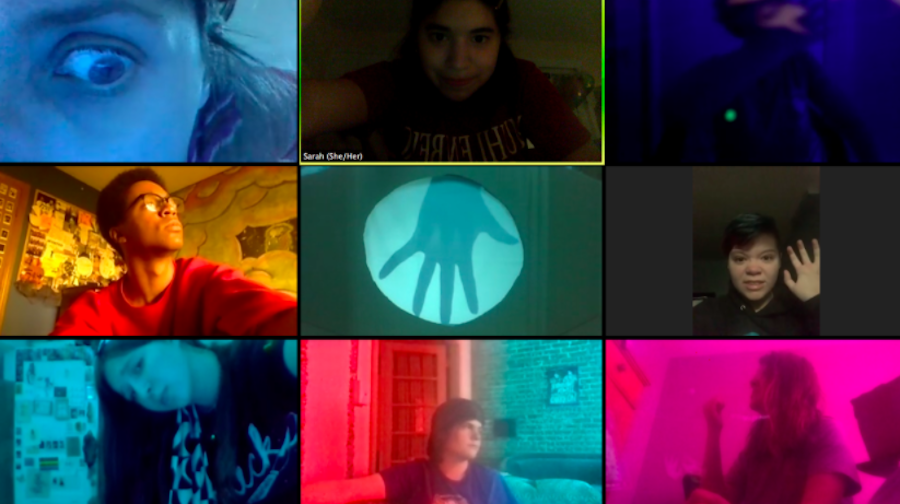In June, the Rose Theater in Omaha, Neb., conducted its four-week summer conservatory camp on Zoom. The seven teen campers, with the aid of two teaching artists, collaborated on a retelling of Mary Shelley’s Frankenstein. The participants created the show’s sets, puppets, and music compositions, and the online show was recorded in one continuous session with no editing.
“Creating opportunities for young people to lead and share their voice is the most important role we as adults can offer in a time of constant change, fear, and unfamiliarity,” said teaching artist Stephanie Jacobsen in an email. “Their clarity in collaboration has constantly exploded many folks’ assumption of what a ‘young artist’ can do.”
Here are responses from the teens about the virtual experience:
“There is so much ugly in the world, so much to miss because of shelter in place, so much to want to change back to the way life was before COVID-19. However, by getting lost in that nostalgia, we miss out on the things we could be taking full advantage of under these circumstances that are completely unique. Doing a show online may not be ideal, but quite frankly, I wouldn’t have had Conservatory 2020 Frankenstein in any other form. Quarantine is definitely not easy, but if we’re here, we have to take the time to learn and grow so that when things change for the better, we haven’t wasted away in the process. This is history we’re a part of—they’ll write about this moment in textbooks and essays. Conservatory 2020 taught me to make sure my voice was on the forefront of that history.”
Wayne Hudson, high school senior

“At its core, theatre is about connection. When I’m onstage, I feel such an amazing connection with the character, with my fellow performers. and with the audience. For our Zoom Frankenstein, internet connection was spotty sometimes, but the connection and friendship that makes theatre theatre, was as strong as ever. We were goofy and heartfelt, and we threw ourselves into creating. Our connection reminded me that when a bunch of creative theatre kids come together, we’re going to perform and make a show, that in the case of Frankenstein, literally came to life. Not being on stage may seem like a hindrance or an inconvenience to some people, to us, it was an opportunity for something greater.”
Noemi Gilbert, high school sophomore
“At its core, theatre is about connection.”
“The pandemic meant a loss of so many opportunities, especially for young people. We missed the end of the school year, graduations, dances, and almost all of summer’s typical rituals. For young artists, it seemed like we had lost theatre too. To my mind, the end of being able to physically come together certainly spelled out the end of an art so reliant on ensemble. So, needless to say, I had my hesitations when I heard the Rose Theater was doing a digital conservatory camp. It seemed like all the things I valued about theatre were missing: performing live, interacting with an audience, forming bonds with your cast, and creating something unique. I didn’t think that was possible when we were all stuck at home, confined by Zoom’s talking boxes. That wasn’t the theatre I knew and loved, but it ended up being so much more.
“Quarantine thrust us head first into a new era of theatre creation, and with that, opened up a lot of opportunity for youth leadership and creativity beyond what we’re used to seeing ‘onstage.’ From the start it was clear that our production process of devising Frankenstein was exploratory. We weren’t there to listen to lessons or recreate the words of a script—we were there to learn through our experience to create something one of a kind. A door was opened on a new kind of creative process where we were the guides of our own journey, the captains of our own ship ‘bound for a voyage of exploration.’ “
Isabella Manhart, high school junior

“Not being able to be in the same room created a sense of trust from the directors to create all of the production elements. Instead of only having to think about what to say, where to stand, and how to say it, we had to become our own mini tech crew, light operator, props master, makeup artist, and costume designer. We still had entrances and exits. We still ran around ‘backstage’ trying to find our props and get ready for our next entrance. It wasn’t as if we were on a Zoom call. We got ready together, we had mistakes in our runs, and we had a tech week. Being able to illustrate each person’s creative talents in this way made for a very cohesive ensemble, where everyone had a valuable part to play.”
Eme Starbuck, high school sophomore
“Our cast played many different parts. Most of the plays I have been involved with, I only had to perform one character. In Frankenstein, not only did we have our characters, but we had our shadow boxes and other visual storytelling elements to be responsible for. There was one point in the play where I had to stand in front of the camera with a magenta gel, turn off my camera, switch the magenta gel to a red one, stand behind my camera, turn it on, wave a pajama shirt rapidly in front of the camera to simulate fire, wait for my camera to be turned off, run to my light switch, turn off my light, put on a jacket, move a table out of the way, switch the gel to a blue one, touch up my makeup, grab my flashlight, sit in front of my camera, turn it on, and then pretend to be strangled. This was all entrusted to me by the directors and my cast. No matter how small a moment in the play, it greatly would affect the ensemble.”
Brianna Robinson, high school freshman

The Soul of an Ensemble
There are mysterious feelings and unexplainable things found in art
If they can’t be described
They can be felt and expressed through different mediums.
I discovered that, when I joined the Rose Theater camp June of 2020.
There is a very deep aspect of artistry A part of it you can’t master
Or memorize by repetitive practice.
It’s something that you have discover inside yourself
Soul.
Soul is found within one’s passion for something.
Whether it be something they have created, a talent, it can even be discovered through inspiration. Every person you ask will tell you a different journey and their very own story about finding their soul in their art.
One of the reasons it can’t be taught.
Soul can be seen in many forms It is seen and felt in the demonstration of what has been found.
The performance
The show
The expression
The words
The poem
The music
The song
The picture
The photo
The description
And even the silence. It can also be seen within someone.
Many people mention a very specific gleam in their eyes
The eyes of the creator, the eyes of the viewer or the listener,
The eyes of everyone who can feel the Soul radiating throughout the room.
It fills the seemingly vast realm of silence.
The same type that holds all of that indescribable emotion.
I’ve been lucky enough to be in the presence of many great creators
Young, passionate, aged, and experienced.
I think all of them would agree with me when I say
Soul is heard when that silence is disturbed.
A silence that can also be forced via societal conformity.
Left undisturbed out of the feared results of it breaking. There are just some silences that need to be heard.
But in our case the silence needed to be diverted.
And used to create a space, a place, and a mind where we could escape aspects of our current situation.
And even more
Use our situation to our advantage.
This experience of creating a work of art
Fueled by the passion and determination of brilliant, creative people
Who logged on to the call knowing
They would be forced to think outside the box
And find a balance between the familiarity and new limits.
Proves that soul is not only within the art itself
But within the people who create it.
It doesn’t take a theatre to put on a play.
All it takes is a group full of soulful passion and fierce determination.
And a little bit of imagination.
And..maybe a cardboard box.
Jules Wuestewald, high school junior


